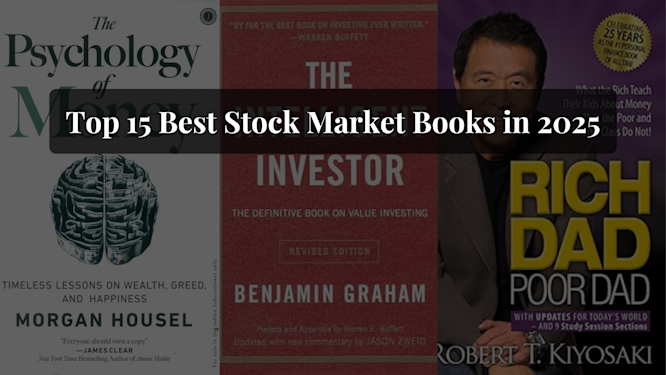Top 15 Best Stock Market Books in 2025
Stock Market Basics
For those investing in stocks, mutual funds, and other financial assets, maximizing returns is the ultimate goal. To do this, it's essential to learn continuously and stay updated with the best market strategies to make the right moves. With the right knowledge and approach, individuals can navigate the complexities of the stock market and enhance their financial portfolios.
There are numerous books available that provide in-depth insights on trading, investment strategies, and market analysis. Whether you’re a beginner or an experienced investor, these books offer valuable guidance to help you sharpen your investing skills. This list covers some of the best books on investment, trading, and the stock market, perfect for anyone who wants to deepen their understanding of financial markets.
1) Rich Dad Poor Dad by Robert Kiyosaki - Best Stock Market Books
First published in 1997, Rich Dad Poor Dad remains one of the most widely read books on personal finance and investing. In this book, Kiyosaki contrasts the financial philosophies of two father figures: his biological father (whom he refers to as “Poor Dad”) and his best friend's father (whom he calls “Rich Dad”). The book highlights the importance of financial education, investing in assets like real estate and businesses, and understanding the difference between assets and liabilities. It also teaches readers the power of entrepreneurship and how they can leverage their money to create wealth rather than solely relying on working for it. This book is a must-read for those looking to cultivate financial independence and wealth-building strategies.
2) Think and Grow Rich by Napoleon Hill - Best Stock Market Books
Published in 1937, Think and Grow Rich has become one of the most influential self-help books of all time. Napoleon Hill spent over two decades interviewing successful individuals such as Andrew Carnegie, Thomas Edison, and Henry Ford to distill the key principles behind their achievements. The book introduces a 13-step philosophy for success, emphasizing the importance of setting clear goals, having a strong desire for success, and maintaining a positive mental attitude. Though it’s not strictly a financial or investment guide, its principles have helped countless investors develop the mindset required for long-term wealth creation.
3) The Psychology of Money by Morgan Housel - Best Stock Market Books
Morgan Housel’s The Psychology of Money explores the often-overlooked emotional and psychological aspects of investing. Housel examines how people’s behavior and mindset impact their financial decisions, discussing everything from risk-taking to the influence of luck. This book highlights the importance of managing emotions when making financial decisions, emphasizing that understanding one’s relationship with money can be just as important as mastering technical knowledge. It’s an insightful read for novice investors looking to grasp the human element of investing.
4) The Intelligent Investor by Benjamin Graham - Best Stock Market Books
Regarded as the "bible of investing" by Warren Buffett, The Intelligent Investor is a must-read for anyone serious about learning the fundamentals of value investing. Written by Benjamin Graham, one of the most respected investors in history, the book focuses on the principles of value investing, which involves buying stocks that are undervalued relative to their intrinsic value. Graham provides readers with timeless insights on how to analyze stocks, bonds, and other investments based on sound reasoning and rigorous analysis. The book is both comprehensive and practical, with advice that has proven invaluable to generations of investors.
5) The Richest Man in Babylon by George S. Clason - Best Stock Market Books
Originally published in 1926, The Richest Man in Babylon is one of the oldest and most well-respected books on personal finance. The book is written as a series of parables set in ancient Babylon, offering timeless advice on managing money, building wealth, and investing. The key lessons include saving a portion of your income, investing wisely, and seeking counsel from knowledgeable individuals. This book simplifies financial concepts, making it ideal for those just starting out on their investment journey. Its straightforward approach to wealth-building makes it an essential read for beginners and experienced investors alike.
6) Coffee Can Investing: The Low-Risk Road to Stupendous Wealth by Pranab Uniyal, Rakshit Ranjan, and Saurabh Mukherjea
Coffee Can Investing presents a strategy that emphasizes low-risk, long-term investments in high-quality stocks. The authors argue that instead of constantly buying and selling, investors should focus on a select group of fundamentally strong companies and hold them for extended periods. The book includes real-world examples from India’s stock market, offering insights into investing in businesses that exhibit consistent performance. This approach is ideal for conservative investors looking to minimize risk while generating substantial returns over time.
7) One Up On Wall Street by Peter Lynch - Best Stock Market Books
Peter Lynch, one of the most successful fund managers of all time, shares his approach to investing in One Up On Wall Street. Drawing from his experiences managing the Fidelity Magellan Fund, Lynch offers practical advice on how to identify promising stocks before they hit the mainstream. He explains how to analyze companies, assess their growth potential, and make informed investment decisions based on observations of everyday life. The book also provides insights into the dynamics of the stock market, helping readers understand how to take advantage of market opportunities.
8) The Millionaire Fastlane: Crack the Code to Wealth and Live Rich for a Lifetime! by M. J. DeMarco
In The Millionaire Fastlane, M. J. DeMarco presents a fresh perspective on wealth creation, urging readers to move away from the traditional "slow and steady" approach to building wealth. DeMarco argues that wealth can be achieved more quickly through entrepreneurship, smart investments, and a mindset shift. This book challenges conventional financial advice, encouraging readers to take control of their financial future by making bold decisions and pursuing opportunities that can generate rapid returns. It’s an excellent read for those looking to break free from the rat race and achieve financial independence on their own terms.
9) Security Analysis by Benjamin Graham and David Dodd - Best Stock Market Books
Security Analysis is another classic work by Benjamin Graham, co-authored with David Dodd, that provides an in-depth exploration of value investing. The book covers the detailed techniques for analyzing stocks, bonds, and other securities based on fundamental factors like earnings, management, and industry conditions. With a focus on long-term value, this book is a more technical and comprehensive guide than The Intelligent Investor and is considered essential reading for serious investors. The principles discussed in this book have stood the test of time, making it a cornerstone of modern investment theory.
10) Secrets of the Millionaire Mind by T. Harv Eker
T. Harv Eker’s Secrets of the Millionaire Mind dives into the mindset of wealthy individuals, exploring how their thought patterns differ from those of the average person. Eker outlines 17 key principles that distinguish successful individuals and explains how anyone can adopt these strategies to create wealth. The book emphasizes the importance of financial habits, including how to manage money, take calculated risks, and think long-term. It's a great read for anyone interested in understanding the psychological aspects of wealth-building.
11) I Will Teach You to Be Rich by Ramit Sethi - Best Stock Market Books
In this practical and straightforward book, Ramit Sethi teaches readers how to take control of their finances, manage their money, and build wealth. I Will Teach You to Be Rich covers a range of financial topics, from saving and budgeting to investing in stocks and retirement accounts. The book is tailored to young professionals and millennials, offering advice on how to manage credit cards, student loans, and other financial obligations. Sethi’s conversational writing style and actionable tips make this an excellent resource for beginners looking to take charge of their financial future.
12) Fooled by Randomness by Nassim Nicholas Taleb - Best Stock Market Books
Nassim Taleb’s Fooled by Randomness explores the concept of randomness and how it influences our financial decisions. The book discusses the role of luck, risk, and uncertainty in the investment world, pointing out that many successful investors often attribute their successes to skill, while failing to recognize the role of chance. Taleb challenges the idea of predictable markets and explains how human biases can lead to poor financial decision-making. This book is particularly valuable for those looking to understand the risks involved in investing and how to avoid common pitfalls.
13) The Millionaire Next Door: The Surprising Secrets of America's Wealthy by Thomas J. Stanley and William D. Danko
First published in 1990, The Millionaire Next Door reveals the habits and characteristics of wealthy individuals in America. The authors argue that most millionaires don’t live extravagant lifestyles, but instead practice disciplined spending, saving, and investing habits. The book provides valuable insights into how ordinary people can achieve financial independence by living below their means and making smart investment decisions. It’s a refreshing take on wealth-building that challenges the common perception of millionaires as flashy spenders.
14) The Black Swan by Nassim Nicholas Taleb - Best Stock Market Books
In The Black Swan, Nassim Taleb discusses the concept of rare and unpredictable events—referred to as “Black Swans”—and how they have a disproportionate impact on our lives and financial markets. Taleb argues that these events are often neglected or underestimated by traditional financial models, and he emphasizes the importance of being prepared for the unexpected. The book also highlights the limitations of predicting the future and encourages readers to embrace uncertainty in their investment strategies.
15) The Warren Buffet Way by Robert G. Hagstrom
The Warren Buffet Way offers a detailed look into the investment strategies of one of the most successful investors of all time, Warren Buffett. The book explores Buffett's approach to value investing, his disciplined approach to buying businesses, and how he manages emotions in the investment process. By understanding Buffett’s methods, investors can gain insights into long-term investing strategies and learn how to navigate market fluctuations with a steady hand.
Other Notable Mentions
In addition to the top 15 books listed above, here are a few more worth exploring:
Common Stocks and Uncommon Profits by Philip Arthur Fisher
Bulls, Bears and Other Beasts by Santosh Nair
The Alchemy of Finance by George Soros
Reminiscences of a Stock Operator by Edwin Lefevre
Stocks to Riches by Parag Parikh
Market Wizards by Jack D. Schwager
A Beginner’s Guide to the Stock Market by Matthew R. Kratter
The Money Manual by Tonya B. Rapley
Fundamental Analysis for Investors by Raghu Palat
Investing in India by Rahul Saraogi
These books provide a wide range of perspectives on investing, trading, and the stock market. Whether you’re just starting your investment journey or looking to refine your strategies, these books offer valuable lessons and principles that can help you navigate the complex world of finance. By learning from the experiences of renowned investors and applying their strategies, you can make informed decisions and build a successful financial future.



